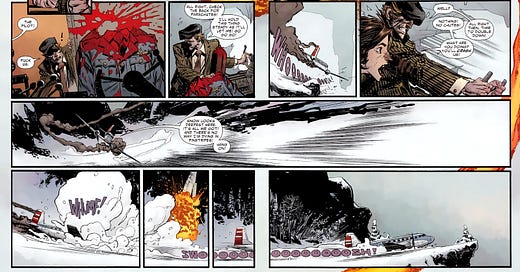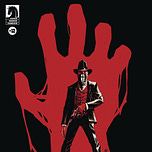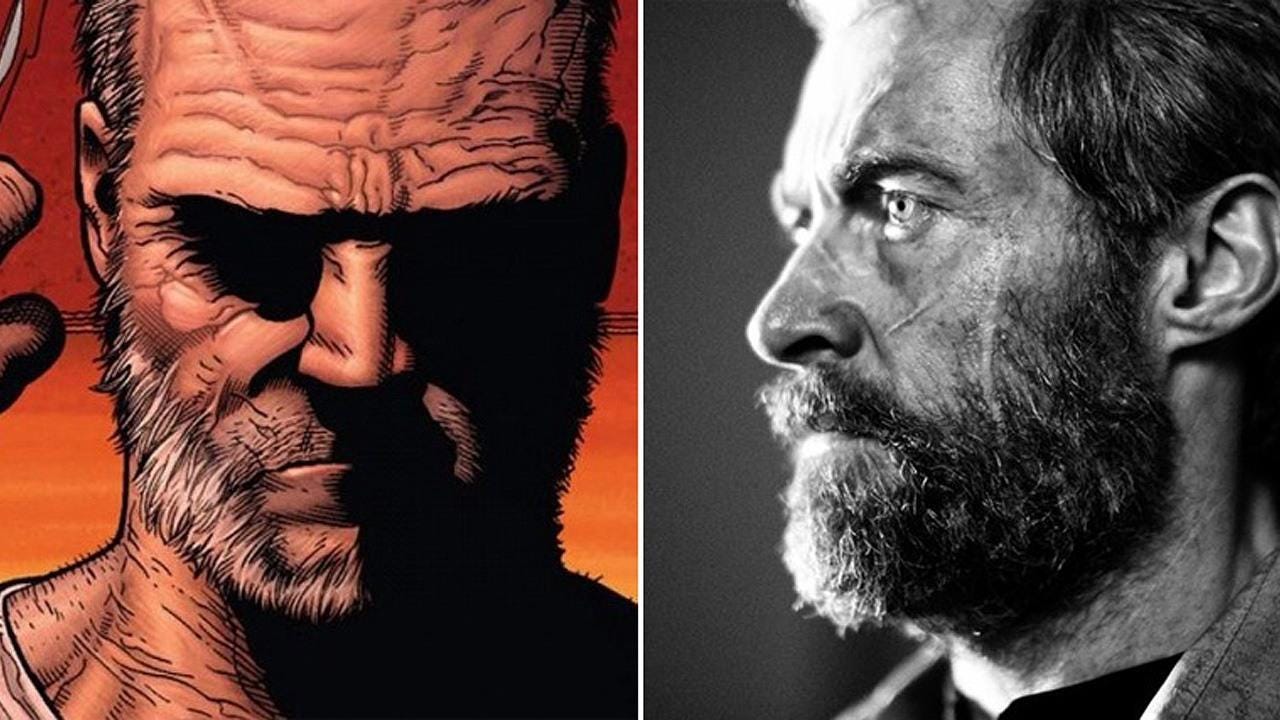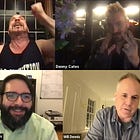Hey guys, it's Scott.
It is Friday, November 10th, and I'm all alone. It's just me. Tyler, great assistant, is away in the UK for Thought Bubble and for a much-needed vacation. If you're anywhere near Harrogate this weekend in England, go by, check out Thought Bubble. It is genuinely one of my very favorite conventions in the world. It's so sincere and dedicated to the craft and to comics as an industry, and it supports the arts in the area. It's just a wonderful vibe, great energy. Go, go, go and say hello to Tyler. Sorry, if you hear weird screeching in the background, it's this gaggle of hawks. They’ve taken nest in our area and the other day I saw one flying by carrying a giant fish. They're very big and frightening. So Jeanie is a little afraid to have like Quinny running around, but he's too big for a hawk, I think, now.
But a tiny bit of housekeeping. So for everybody that's in the Black Jackett Club, the time has come for you to send your books. I'm going to send you all the details through Tyler, but you can send up to 10 books of yours, trades, floppies, whatever you want. You're going to send them down to Mike Haslem, one of the guys who works at Comic Sketch Art. I'm going to fly down to Florida, sign all your stuff in December and fly back. So you'll receive them somewhere hopefully around Christmas, possibly in the new year. And then what we'll do is for everybody who's a paid subscriber in the normal tier, you get to send two books to the same place. I'll go back down in February or so and early February sign your books and you’ll get those. So you just have to pay shipping. Again, we’ll put all the details in a link here, but get ready, because if you’re going to send something, we need them to be there in about a month from now. So start thinking on it, preparing your stuff, and I’ll get ready to sign! I got my signing hand all set.
Also, thank you guys so much for the kind words on Canary. I got a great note from Dan Panosian, my co-creator on it, saying how thrilled he was just to see the response. It's a really challenging book to make. It really does straddle the line between horror, Lovecraftian cosmic terror, and pure western. And it's a book that's very much about this moment in time. So I hope you'll check it out. It's one of those ones that really pushed us both creatively. Some books, again, are your comfort zone. Some books, it's exciting to kind of take you on a walkabout into someplace outside that area of familiarity. And this is definitely the latter. So check it out.
And so today I'm going to do a free part of the post and then a post for paid subscribers. The paid subscriber post, I want to talk a little bit about hanging on and letting go, talking about working with multiple artists on a book and how you adjust for their different styles and different ways. And I’ll use a couple different examples of fill-ins. We’re going to post them, I’ll give a script, so you’ll get plenty of material on the other side of the paywall. But first, for the free post, I got a lot of questions about superhero comics this week, I think party because of some of the comments that Mark Millar made. He's a good friend. I love Mark. He was one of my absolute first supporters and mentors. He invited me out to this great convention he ran, Kapow!, when I was just starting out, and he's been an endless fount of great advice, and I really am grateful to him. And what he was saying was that what the industry needs in some way is to invite back superstars to do big takes and big swings on the characters. And I don't disagree with that idea. I think it's always exciting to see somebody return to superheroes or to see them switch companies or just to see them switch characters as well.
And so I'm not disagreeing with what he said about that being good for the industry in some way. And he mentioned how high page rates used to be, which, I have never made a thousand dollars a page or anything like that. I certainly have done well on Batman, mostly from royalty rates and all that kind of stuff and high page rates when you're doing events. But obviously raising rates and being able to pay people well certainly attracts great talent. But I think the other thing to keep in mind is that it needs to be a collective swing. One person or a couple people coming back at once, I don’t know if it can really move the needle. It can if it’s done in stages But when I think of the moments that have really excited me in comics, it isn’t just about superstars. It’s about superstars coming back as rising stars are given the chance to take big swings as well.
So it’s that moment of Marvel architecture in the 2000s when people like Matt Fraction and David Aja could do Hawkeye while somebody like Jason Aaron was taking on Thor, which is a little bit later but still, or Brian Bendis doing Avengers and that stuff. It's the combination of up-and-coming talent being given leeway and creative freedom to take really big swings and I think bigger creators coming back to do the same. But to me it's collectivism. It's the idea of all of it happening all at once. What was exciting to me when you think about, I mean, Mark Millar is probably responsible for more of the Marvel Cinematic Universe than almost anybody else. His The Ultimates, if you haven’t read it, is obviously the foundational material for The Avengers. Old Man Logan is also responsible for Logan. So along with Brian Bendis and Dan Slott, to me he's just one of the absolute essential people who's created this whole design of material that wound up being crucial to the creation of the Marvel Cinematic Universe.
Also, the thing I'd point out is that that happened at a moment when the industry was really down, right? In the late 90s, after this kind of really extreme financial collapse and also hyper-violent, very dark comics, there was sort of a desire on Marvel's part and DC's part to try something different. And so the Ultimate Universe was born with Brian Bendis and Ultimate Spider-Man, which was a big hit. But then also The Ultimates with Mark Millar. It was a collective swing. Some things didn't work. Orson Scott Card on Iron Man, for example. But it was a valiant attempt. And I think part of it was people being allowed to take big swings for the fence at once. So for me, it is exciting, the idea, again, of bringing back a superstar or that kind of thing. And I do think there's importance to that, to having big architectural figures. But I think in addition, there needs to be a climate of experimentation.
There needs to be a kind of a thesis to the moment for things to really take off. And that might just be that we're all trying something new. We're all trying something because things aren't working, or we're trying something because things are working and there's a lot of attention in comics. But those inflection points, I think over the last 20 years, have been moments when a company is willing not just to kind of pony up for one person or a couple people, but there's an ideological shift and there's a kind of sense among editorial too that we're doing something together to redefine what our company stands for, what these heroes stand for. We're willing to change aspects of them, change things we're doing in story to be able to make them speak to this moment in new ways, to speak to this generation in new ways.
It doesn't mean It doesn't mean throwing things out like, the baby with the bathwater. It just means being able to be daring and progressive and take some risks in a storytelling way. It's Superior Spider-Man. It's Jason Aaron's Thor. It's all these things. It's Jonathan Hickman's X-Men. It's being able to have these big books that take some risks, then almost create an umbrella or a sunshine, really, to grow newer creators' books that are also taking risks. When Donny Cates comes up doing Thanos and then Venom while things are really thriving with bigger swings being taken at that time and then he becomes a superstar, right?
So, same thing, James Tynion IV comes up in an era when we're able to do these big things on Batman and Grant is working over with The Multiversity and all kinds of big things are happening at DC. He comes up, sheltered by that a bit, to be able to take a big swing like he was in Detective and then Batman and really make a huge name for himself and do his own things, like creating a Detective team with Batwoman and Clayface and Cassandra and Steph and all this great stuff that couldn't have been done without that pervasive spirit throughout the company at that moment that in that department we were going to try different things. So for me, it's all of it at once. It's definitely it's a commitment to bringing big creators in. It's a commitment to trying to give your best page rate and all of those things. But it's more a matter of an ideology, a thesis. It's crucial that editorial is on board.
And I got to reiterate that I'm not saying that I'm doing anything superhero-wise, but one of the things that I've learned over the years is when editorial believes in something, and there's nobody better in the pop cultural landscape than comic book editors, in my opinion, as advocates of storytelling. When you get in there and you talk to your editor and your editor believes in something with you and you're a team, especially if it's a group, the whole team of editors believes in what the company is doing, there's an infectious excitement. They're the ones that are the unsung heroes of comics that get like, no credit half the time for the things that they do. And that feeling of editorial, creators, and the publishing higher-ups at the company all feeling like we’re taking this swing together. That’s when your get Rebirth or the New 52. That’s when you get Hickman’s Secret Wars and All New, All Different. Just these swings that turn your head. Some things work, some things don’t, but those are the moments that really excite me. That's, to me, the thing that would really create a healthy industry right now. And I think part of it is that it's difficult. There are forces at work with Marvel and DC that really are out of our control.
DC and Marvel, back in the days that they were doing the first Secret Wars or the first Crisis on Infinite Earths, they didn't have parent companies. Marvel, after going public, it had shareholders and those things. But still, now DC has multiple companies it’s beholden to as a part of things, and that’s not necessarily a bad thing. I'm not saying, “oh, it's in this bad spot.” But I'm saying that it doesn't have the same flexibility to take the same kinds of swings. Does it mean it can't? No, it might be gearing up to take a huge one or not. I mean, Marvel might be gearing up to take an incredibly huge one, too. You don't know. I'm just saying that there are different forces at work— tectonic, big, seismic things on these companies now that weren't there before that I sometimes think make it more difficult to create a collective inflection point or moment.
But again, that said, I don't think they can't do it. I think, in fact, like you'll see a lot of stuff coming from both that are going to be really huge turning points. And it makes me very excited to think about. I just feel as though it's a multifaceted issue. It's complicated because There's so many things, so many gears and cogs at these places right now that weren't there 10, 15, 20 years ago in terms of their connections to other companies. And sometimes, again, that means that they can spend more on comics. Sometimes it means they can take a bigger swing. Sometimes it means they have more creative freedom. Who knows? But there's more stuff in the climate than there was before. So I think sometimes when people are like, “well, why don't they just open up their pocketbooks?” or “why don't they just do this?” There are different forces at work. But I think a lot of people at both companies right now are very committed to doing really big stuff in 2024-25. And that's super exciting for me. So anyway, just some thoughts.
OK, going over to the paid posts. Again, you can always sign up. It's just $7/month. You get every class that we've done so far. We've done like, 20 classes. We've done interviews with everybody from Greg Capullo to Donny Cates to James Tynion IV to Joshua Williamson. You get all that material in an archive for $7. And you get to skip lines at cons and all kinds of cool shit. But that's my pitch. I won't drive it home.
But as we get closer to the stuff with Wytches, also, and some other stuff I'm going to be doing out soon, we're going to be loading up the paid area of this thing with cool extras. So you'll see. But this time we're going to put in a script, we're going to put in some issues. I'm going to talk a little bit about Superman Unchained. I'm going to talk a little bit about Nocterra because the third trade is out this week and just working with different artists on the same story, American Vampire, that stuff. So Ty's going to include some really good stuff for you guys to see. All right, I'll meet you over on the other side of the paywall!
Listen to this episode with a 7-day free trial
Subscribe to Our Best Jackett to listen to this post and get 7 days of free access to the full post archives.


















